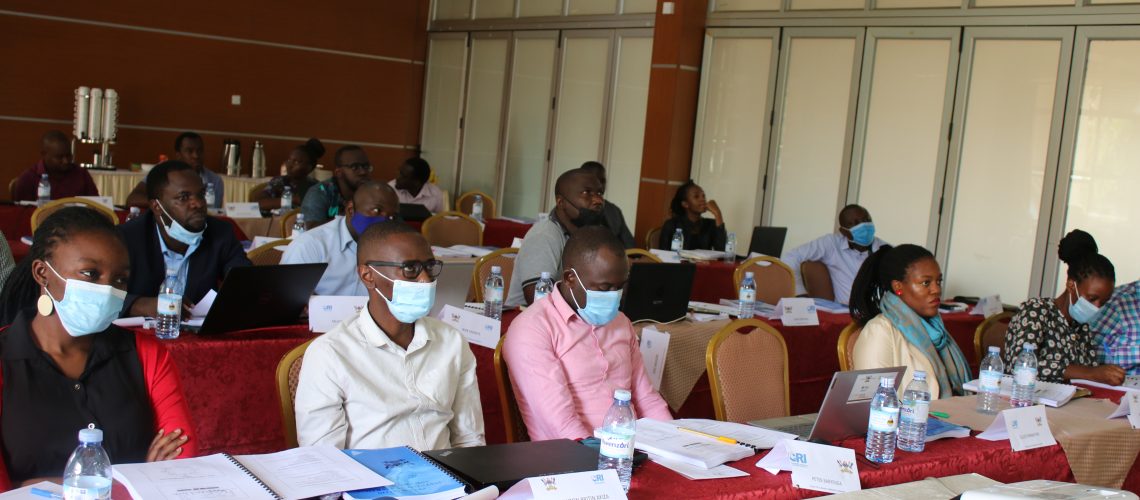Capacity Building

- Public Investment Management Basic Training
The Centre offers a 5-day short course in Basic Public Investment Management emphasizing Project Preparation through training in writing acceptable Project Concept Notes (PCN), Project Profiles, and Pre-feasibility and Feasibility Studies. How these are input into the Integrated Bank of Projects (IBP) for the necessary approvals is a subject of this training. Only well-prepared and Economically viable Projects are allowed into the Public Investment Plan (PIP) to access funding from the National Budget. The short course (5 days) further gives highlights on Project Implementation (Procurement, Execution), Project Monitoring and Evaluation (including Impact evaluation). This training targets officers involved in preparing, managing, and implementing projects. The following areas are covered at an introductory level:
- Overview of Public Investment Management Systems (PIMS) in Uganda
- Project Concept Note
- Project Profile
- Public Private Partnerships
- Integrated Bank of Projects (IBP)
- Integrated Investment Appraisal (Financial, Economic, Risk, and Stakeholder Analyses)
- Climate Smart Project Appraisal (Climate Proofing Public Investments)
- Environmental Risk Assessment and Management
- Social Risk Assessment and Management
- Project Implementation
- Project Procurement
- Project Monitoring and Evaluation
- Project Impact Evaluation
- Program on Investment Appraisal and Risk Analysis (PIAR)
The Program equips participants with the analytical tools needed in appraising Public Investment decisions before committing public resources. It applies an integrated approach where modules in Financial, Economic, Risk, and Stakeholder analyses are covered. The training is divided into two-week sessions and targets officers involved in the appraisal of projects at both preparation and approval stages. It is facilitated by a collaborative faculty membership from Cambridge Resources International (CRI) based at Queens University in Canada, the Makerere University PIM Center of Excellence, the Ministry of Finance Planning and Economic Development, and the National Planning Authority. Below are the two modular divisions and their respective contents:
Financial and Risk Analysis
- Public Investment Management
- Role of Integrated Investment Appraisal in Public Investment Management
- Alternative Investment Criteria
- Development of Cash (Resource) Flow Statements
- Integration of Movements in Prices, Inflation, and Exchange Rates
- Impacts of Inflation
- Financial Modelling from Alternative Points of View and Estimation and Use of Debt Service Ratios
- Determining the Financial and Economic Values of Existing Assets
- Scale and Timing and Adjusting for the Length of Life in Project Appraisal
- Project Finance and Project Risk
- Cash Flow Waterfall
- Risk Analysis
- Climate Smart Project Appraisal
- Application of Crystal Ball (Skynet)
- Cost-Effectiveness Analysis
Economic and Stakeholder Analysis
- The role of Economic and Stakeholder Analysis in Investment Appraisal
- Microeconomics for Economic Evaluation of Infrastructure Investments
- Principles underlying the Economic Analysis of Projects
- Economic Cost of Foreign Exchange
- Determining the Financial and Economic Values of Existing Assets
- Economic Prices and Conversion Factors for Tradable Goods
- Measurement of Economic prices for Non – Tradable goods and services
- Economic Valuation of Transportation Investments
- Economic Evaluation of Electricity and Renewable Energy Generation Investments
- Measurement of the Economic Benefits of water projects
- Economic Opportunity Cost of Labour
- Stakeholder Analysis and Economic aspects of Foreign Financing
- Economic Opportunity Cost of Capital
- Economic Analysis of Education Projects, Human Capital, and Infrastructure
